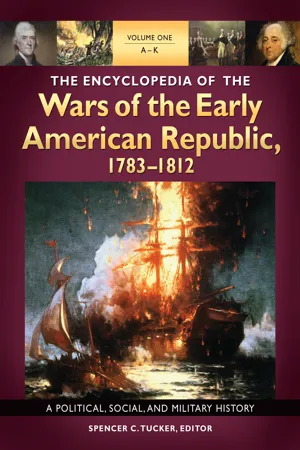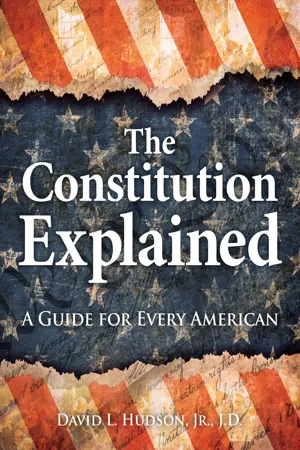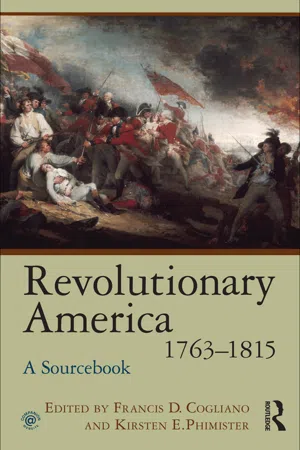Politics & International Relations
New Jersey Plan
The New Jersey Plan was a proposal presented at the Constitutional Convention in 1787, advocating for a unicameral legislature with equal representation for each state. This plan was in contrast to the Virginia Plan, which proposed a bicameral legislature with representation based on population. The New Jersey Plan aimed to protect the interests of smaller states and ultimately influenced the creation of the United States Congress.
Written by Perlego with AI-assistance
Related key terms
3 Key excerpts on "New Jersey Plan"
- eBook - ePub
The Encyclopedia of the Wars of the Early American Republic, 1783–1812
A Political, Social, and Military History [3 volumes]
- Spencer C. Tucker(Author)
- 2014(Publication Date)
- ABC-CLIO(Publisher)
The New Jersey Plan also called for a provision for admitting new states, for a common rule for naturalization, and for treating individuals who committed offenses in other states just as those individuals would be treated if they were state citizens. Matters such as the amending process, which the New Jersey Plan omitted, would presumably have remained the same as under the existing Articles of Confederation.New York’s John Lansing, who eventually left the convention rather than continuing its discussion of the Virginia Plan, made the first speech in defense of the New Jersey Plan. He focused not so much on the merits of the plan as on the fact that it was more in line with what the states and Congress had commissioned, and he hence thought that it was more likely to be adopted. Paterson himself proceeded to argue that the Articles of Confederation were a type of treaty and that changes in state representation could therefore not be made without the unanimous consent of the states that agreed to it. He further argued that state sovereignty required that “the Representatives must be drawn immediately from the States, not from the people.” Paterson was concerned both that a bicameral legislature was unnecessary and that it would be expensive.Initially the New Jersey Plan gained relatively little favor, and the convention continued using the Virginia Plan as its primary template. Over time, however, the New Jersey Plan resulted in a compromise resulting in equal state representation in the Senate. Elements of the New Jersey Plan also became incorporated in the method for selecting members of the federal judiciary, with the president nominating judges, as the New Jersey Plan specified, and the Senate, to which the Virginia Plan would have entrusted appointments, confirming them. The supremacy clause also found its way into the final Constitution. In other ways, too, the New Jersey Plan indicated concern that the government proposed by the Virginia Plan was too national in character. The New Jersey Plan perhaps signaled the ultimate demise of the congressional negative on state laws and the creation of other limitations on congressional powers.JOHN R. VILE - eBook - ePub
The Constitution Explained
A Guide for Every American
- David L. Hudson(Author)
- 2022(Publication Date)
- Visible Ink Press(Publisher)
The Founders mainly discussed the Virginia and New Jersey Plans. The Virginia Plan was favored by the larger states, while the New Jersey Plan was favored by many of the smaller states. The biggest area of disagreement between the two focused on representation in Congress.The larger states, such as Virginia, wanted representation in Congress based on the population of the state. This is called proportional representation. Proportional representation would favor the larger states because they had greater populations.The smaller states, such as Delaware, opposed proportional representation. Many of the delegates from the smaller states feared the power of the larger states. They tried to ensure that each state would possess equal power under the new constitution. Gunning Bedford (1747–1812), a delegate from Delaware, expressed his concerns: “I do not, gentlemen, trust you. If you possess the power, the abuse of it could not be checked; and what then would prevent you from exercising it to our destruction?” Bedford went so far as to suggest that the smaller states would seek support from foreign countries to protect their interests.They advocated the position of the New Jersey Plan—equal representation. Equal representation would favor the smaller states because they would have the same numbers of representatives as their larger neighbors. This issue nearly led to a premature ending of the Convention.“There was an ever-present danger that the Convention might dissolve and the entire project be abandoned,” writes historian Catherine Drinker Bowen. Delegate Luther Martin of Maryland admitted years later: “We were on the verge of dissolution scarce held together by the strength of a hair.”However, many delegates recognized that they must come to some agreement. If the delegates could not agree, their country might fall prey to foreign powers. Elbridge Gerry (1744–1814) of Massachusetts warned his colleagues: “If we do not come to some agreement among ourselves, some foreign sword will probably do the work for us.” - eBook - ePub
Revolutionary America, 1763-1815
A Sourcebook
- Francis D. Cogliano, Kirsten E. Phimister(Authors)
- 2010(Publication Date)
- Routledge(Publisher)
The Virginia Plan (document 2) would strike at the authority of the states—both because it would vest so much authority in the federal government and because representation within the proposed bicameral congress would be apportioned according to population. Under the Continental Congress and the Articles of Confederation, each of the states were equal and possessed one vote. On June 14 and 15, 1787, William Paterson (1745–1806) of New Jersey presented an alternative to the Virginia Plan. According to Paterson’s plan, which had the support of several small states which feared they would be overwhelmed under the Virginia Plan,Congress would have increased powers but it would retain a unicameral structure and each state delegation would have one vote. Paterson’s plan was closer to the original intention of the Constitutional Convention in so far as it recommended modifications to the Articles of Confederation rather than their replacement by a new constitution. The New Jersey Plan prompted a debate about the nature of representation in the new government, and a compromise emerged whereby representation in the lower house of Congress, the House of Representatives, would be according to state population but each of the states would be equal in the upper house having two votes in the Senate.1. Resd. that the articles of Confederation ought to be so revised, corrected & enlarged, as to render the federal Constitution adequate to the exigencies of Government, & the preservation of the Union.2. Resd. that in addition to the powers vested in the U. States in Congress, by the present existing articles of Confederation, they be authorized to pass acts for raising a revenue, by levying a duty or duties on all goods or merchandizes of foreign growth or manufacture, imported into any part of the U. States, by Stamps on paper, vellum or parchment, and by a postage on all letters or packages passing through the general post-Office, to be applied to such federal purposes as they shall deem proper & expedient; to make rules & regulations for the collection thereof; and the same from time to time, to alter & amend in such manner as they shall think proper: to pass Acts for the regulation of trade & commerce as well with foreign nations as with each other: provided that all punishments, fines, forfeitures & penalties to be incurred for contravening such acts rules and regulations shall be adjudged by the Common law Judiciaries of the State in which any offense contrary to the true intent & meaning of such Acts rules & regulations shall have been committed or perpetrated, with liberty of commencing in the first instance all suits & prosecutions for that purpose in the superior Common law Judiciary in such State, subject nevertheless, for the correction of all errors, both in law & fact in rendering judgment, to an appeal to the Judiciary of the U. States.
Index pages curate the most relevant extracts from our library of academic textbooks. They’ve been created using an in-house natural language model (NLM), each adding context and meaning to key research topics.


